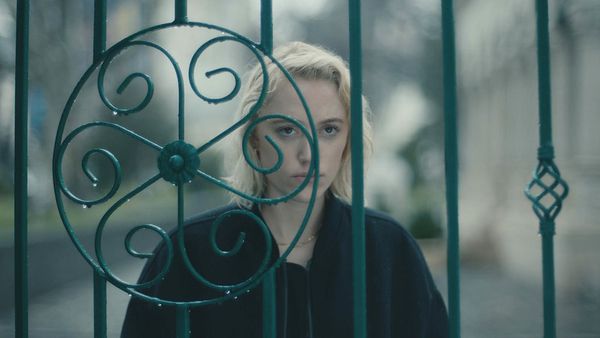Eye For Film >> Movies >> Watcher (2022) Film Review
Watcher
Reviewed by: Jennie Kermode

Vanishingly few American films set in Romania escape the shadow of Dracula. Early on, the heroine of this one – Maika Monroe’s Julia – gives her husband a plastic Dracula figurine which she has picked up in a curiosity shop as an affectionate joke. This is not a film about vampires, but it is a film about the spilling of blood and the conviction that a predator is nearby. It’s also a film full of little references and games, teasing the subconscious. In the opening scene, we see Julia’s face through the rear side window of a car, almost obscured by reflections of Bucharest. Later, she will stand in front of her apartment window flicking the light on and off, watching her reflection appear and disappear.
Julia is from new York. She speaks no Romanian, though she’s making a bold effort to learn from tapes. She has bravely agreed to move out there with her husband Francis (Karl Glusman), whose mother was Romanian, so that he can accept a promotion from the marketing company for which he works. Isolated in her palatial but lonely apartment, she attracts the sympathy of Irina, the only one of her neighbours who speaks English, and makes a solitary friendship. Perhaps it’s more than some people have. When her curtains are open at night, she becomes convinced that a figure in another window, across the street, is watching her.
Somebody also appears to be following her. It frightens her enough that she tells her husband and they get the police involved. Things have moved on a little since women were stalked in films in the thrillers of the Sixties and Seventies – but only so much. Soon she is confronted with those superficially soothing denials with which almost every woman will be familiar. It’s probably just a coincidence. If the man lives nearby, why shouldn’t she keep seeing him? Why does she keep reaching for the most unreasonable explanation? It’s hard to know how to explain to somebody who has never had to live with that fear that what’s reasonable for her and what’s reasonable for him are two very different things.
Herein lies the film’s power. Originally written by a man, and following in the footsteps of any number of such works, it was rewritten by feminist filmmaker Chloe Okuno, who also directs. In an early scene, just after buying the figurine, Julia walks along the hallway of her apartment building and we see how tired she is: her flat feet, her spaced legs, her heavy tread. It’s a little thing, but it’s in complete contrast to how such women move under the gaze of a male director. There is a different kind of understanding at work. In formal clothing, Monroe looks like one of Hitchcock’s blondes, but her face won’t cooperate with that gilded image: she is stubbornly, inconveniently human. Every uncomfortable emotional expression reads like a demand to be recognised by the male characters as a whole person.
Through this lens, through this empowered performance, familiar material feels very different. Okuno makes wonderful use of the spaces in the apartment, demonstrating that she can pull off that elegant geometric framing which contributed so much to Hitchcock’s work, but she also knows when to present us with stark realism. The camera notices what Julia notices, picks out those details which sound an alarm. The rewritten script also delivers a more genuine reaction to male dismissal than we usually see: not just frustration and fear, but anger, and that particular kind of disappointment which develops when one comes to recognise the impossibility of having a real, meaningful conversation with the person one loves. We feel the weight of Julia’s loneliness not just because Francis is frequently at work, but because even when he’s present, there’s a sense in which she is entirely on her own.
The language of this film comes down to who is watching and what we are invited to watch. Trying to take control of her situation, Julia is always watching. Only once, when the pressure becomes unbearable, does she pointedly look away, focusing her attention on a plastic bag whose semi-translucent folds and curves offer any number of interpretations. Given the nature of the film it isn’t really a spoiler to say that there is a killer – there might even be more than one – and in a couple of places, Okuno alludes to the modus operandi of Ted Bundy. What does a watcher want? Bundy said that the thing he was pursuing, the thing he valued most, was the sense of possession that came from being the last thing a dying woman saw. There is more than one interpretation of that here, along with a final gaze which invites the viewer to occupy the space of the possessor and, conversely, to be possessed.
Confident, stylish and very cold, Watcher may still have a bit of problematic baggage but it is a superior example of its type. Okuno captures fear not as it is fetishised but as it is experienced. Monroe is excellent as always. The shadows of Bucharest have rarely been this dark.
Reviewed on: 04 Jun 2022


















